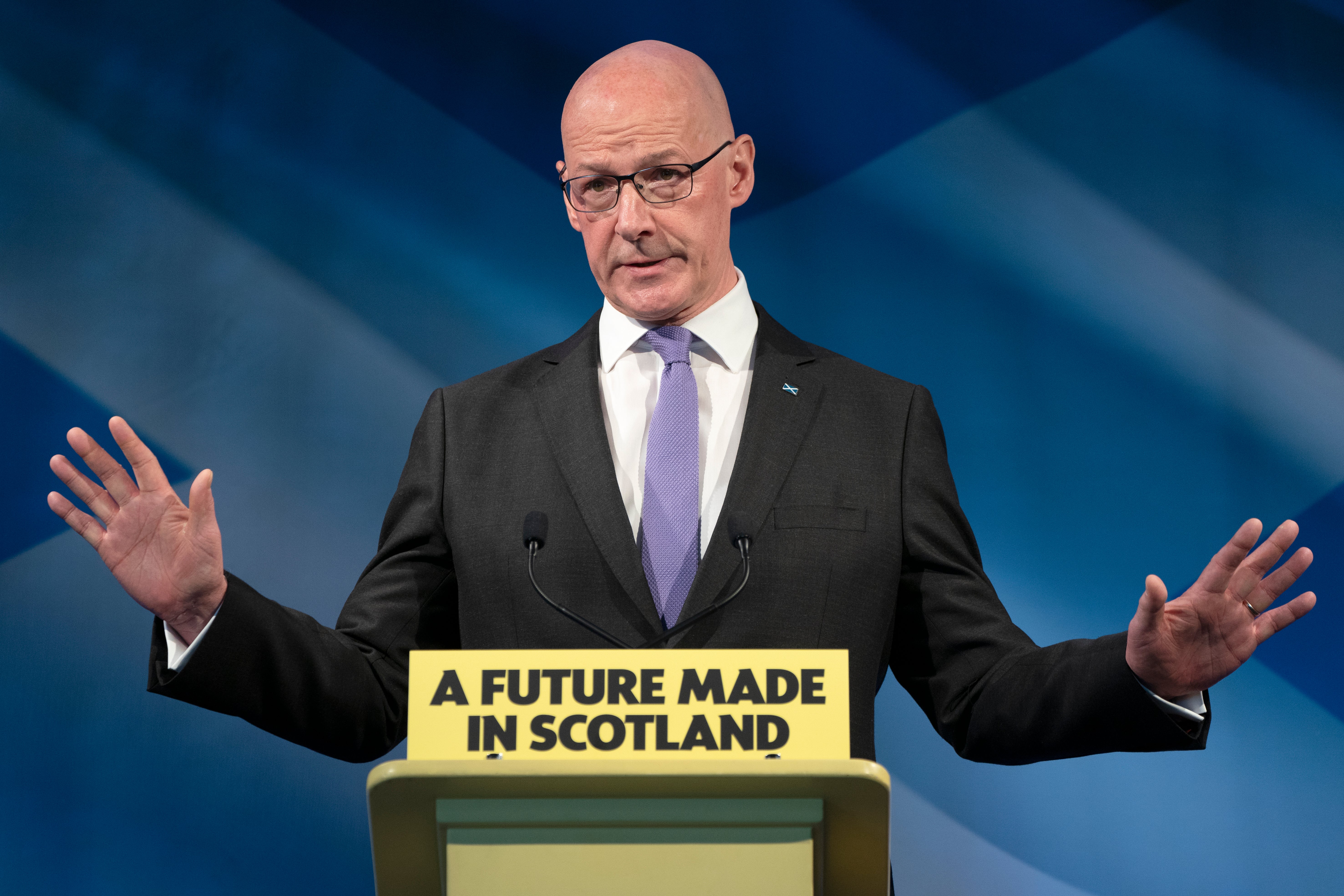Scotland’s love-in with Labour could be a brief encounter
When John Swinney launched the SNP’s election manifesto, he warned voters considering backing Labour to be ‘careful what you wish for’. His own nationalist party is embattled and out of favour on the doorstep – but, says Andrew Grice, it could easily become a vehicle for those disappointed by a Starmer administration


What a difference five years makes. At the 2019 election, the main issues in Scotland were Scottish independence and Brexit. Both suited the pro-Remain SNP, which won 48 seats to Labour’s one.
This time, the overriding theme is how to oust the Conservatives at Westminster, which suits Labour very nicely when it looks capable of doing that for the first time since the Tories came to power. The SNP’s problem is that it looks largely irrelevant to the main question.
The top issue for Scots is the NHS, which is why SNP leader John Swinney proposed a £10bn-a-year boost to health spending in the manifesto he launched today. But this was a demand on the next UK government, which holds the purse strings; only £1.6bn of the money would go to Scotland.
Swinney told voters considering Labour to be “careful what they wish for”, because “voting Labour in Scotland will get you spending cuts”. His challenge to Labour was “Where is the change?” when the party is committed to the two-child benefit limit, Tory fiscal rules that mean austerity, and remaining outside of the EU (which the SNP would rejoin). Fair questions with which plenty of Labour figures would privately agree.
Although independence has not featured much in the campaign, it is still on page one of the SNP manifesto. It says the Scottish government would be empowered to begin immediate negotiations with the UK government if the SNP wins a majority of Scottish seats.
But it is unlikely to do so, and Swinney dodged questions on whether failure to win a majority of seats would be a vote for the union. If that happens, the SNP will likely argue the 2021 Scottish parliament elections are still a mandate for a second referendum.
Swinney admitted the SNP has had “a tough time” of late. Unusually, it meets some hostility on the doorsteps. “People are scunnered,” one candidate reports. Some voters want to punish the SNP for the controversy which saw the once-infallible Nicola Sturgeon arrested and her husband Peter Murrell, the party’s former chief executive, charged in connection with embezzlement of funds. Then there’s Humza Yousaf’s miserable year as first minister and the party’s patchy record on public services during 17 years in power in Edinburgh.
The hope of independence masked the SNP’s performance – but there has been no hiding place since the Supreme Court ruled that the power to call a referendum lies with the UK government.
The momentum is with Labour, which has raised its target during the campaign to about 35 of the 57 Scottish seats. However, many seats are very tight, with one model suggesting 21 could be decided by five points or less.
Despite that, Labour senses a chance to settle old scores: in 1979, the SNP brought down the Labour government and helped keep it out of power until 1997. Then, the SNP ended Labour’s dominance in Scotland by reducing it from 40 seats to one at the 2015 general election.
Anas Sarwar, the impressive Scottish Labour leader, has revitalised his party. He is part of the Starmer Project but has licence to distance himself from Keir Starmer on tricky issues such as the two-child limit and Gaza, on which the SNP attacks Labour.
Such criticisms do not seem to have dented Labour’s appeal. “The SNP has gone from saying, ‘There’s no point in voting Labour because it can’t win at Westminster’ to saying, ‘There’s no point because it will win’,” one senior Labour figure told me. Labour’s “change” message offers much more clarity.
Although Labour is narrowly ahead of the SNP in recent Scottish polls, senior Labour figures admit privately there is little love for the party or Starmer. All parties agree Starmer is an issue on the doorsteps, and not in a positive way for his party.
Labour’s expected victory in Scotland might not signal a permanent shift. Some SNP supporters will “lend” Labour their votes to “get the Tories out” – but Labour will have a much bigger battle on its hands to regain power at the 2026 Scottish parliament elections. Voters who “lend” votes can take them back, as many of the 2019 Tory voters in the red wall in the north and Midlands will do on 4 July.
Labour will take the win, then: it’s as desperate for a win in Scotland as the Scottish team is for one at the Euros.
However, a Labour victory would not mean the SNP’s dream of independence is dead. It’s just sleeping. A breakaway is seen as unrealistic in the short term, but this patient could easily revive to rude health. While the SNP’s ratings have slumped, the polls show Scotland is still split down the middle on leaving the UK.
Scots are not yet emotionally invested in Labour in the way they were in the SNP since the 2014 referendum; they will be looking for an early dividend from a Labour government. With money tight, that will be difficult. The SNP, and the goal of independence, could easily become a vehicle for Scots disappointed by the Labour government.
The affair between Scotland and Labour might prove a brief one.






Join our commenting forum
Join thought-provoking conversations, follow other Independent readers and see their replies
Comments